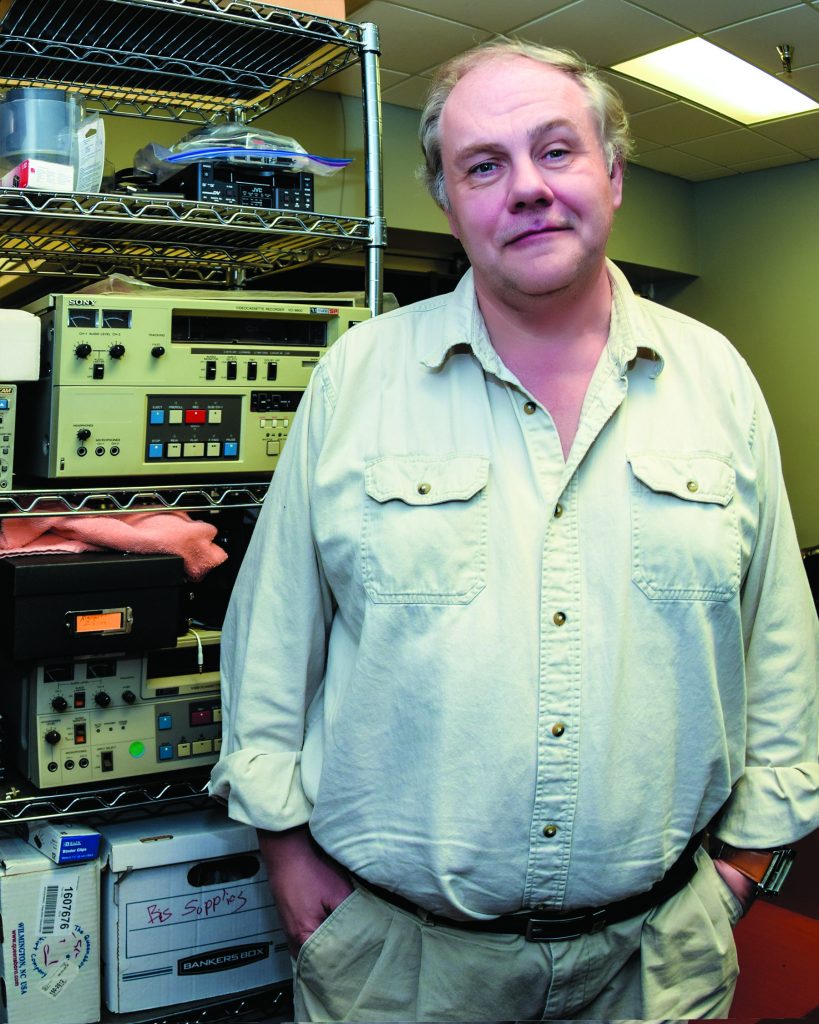
Nancy Edmonds Hanson
hansonnanc@gmail.com
Moorhead Community Access Media does a lot with a little. Now director Tony Tilton says the tables are turned: “We really need a little help from our friends.”
Always long on ideas and short on money, the community public access TV operation is facing a critical failure of its technology. The shoestring operation has long made do with used cameras and editing equipment acquired through a combination of horse-trading, make-do and the director’s personal cache of hardware. The rickety roster of ramshackle gear is past due for an upgrade.
Now, in the era of high-definition television and with a growing roster of original hyperlocal productions, MCAM has launched its first-ever public capital campaign – a modest fund drive to upgrade its key equipment and support streaming services and other expenses.
“We’re looking for $10,000 to buy equipment and another $5,000 to cover some of our production costs,” Tony explains. “We need to add three prosumer cameras and a computer capable of 4K HD (high-definition) editing.” (Prosumer gear falls halfway between what consumers use and professional broadcast equipment.) The additional funds, he says, will cover livestreaming services for a year plus a small amount to hire part-time student helpers to cover Moorhead Spuds football and other sporting events.
He’s turning to Moorhead viewers and businesses in the hope of reaching that modest goal.
If commercial broadcast television carries an aura of glamour, MCAM is the absolute opposite. The noncommercial TV operation, quartered in the Moorhead Center Mall, quietly provides the public with a way to take their messages to local audiences absolutely free. Unlike the “big guys” in commercial broadcasting, its programs never take to the airwaves. Instead, they’re distributed over cable providers CableOne and Midco. CableOne carries MCAM’s governmental programming on Channel 58 and public access on Channel 69; both are accessible to Moorhead and Fargo subscribers. Midco’s two channels – city government on 12 and public on 99 – can be seen only in Moorhead.
That limited reach expanded dramatically last year when MCAM began livestreaming over the internet. “Now you can watch us anywhere in the world, 24/7,” Tony notes, “on your laptop, smartphone or Smart TV.” The big step was made possible by a four-year, $25,000 loan from city government, which enabled the private nonprofit to purchase the hefty computer required to provide digital service.
MCAM owes its existence to cable franchising fees. Starting in the 1980s, the Federal Communications Commission gave cities the right to request public access on their systems. Franchise fees are used to underwrite costs of their operation. Moorhead currently allocates $65,000 per year to MCAM – a tight budget that covers the director, production supervisor Cody Greff and assistant Eric Falde, as well as utilities, rent of two rooms at the mall, and incidentals.
It’s an example of what the FCC calls PEG – public, educational and government access narrowcasting mandated under the Cable Communications Act of 1984. The majority of mandated public-access channels are limited to billboard-type announcements of community events and videos produced and submitted by local churches and interest groups.
Under Tony’s direction, MCAM has stepped up to do much more. It not only broadcasts videos submitted by churches and others; he and his staff train volunteers to shoot and edit their own shows. “People can bring in what they have. We’ll broadcast it. Or we’ll teach and equip them to produce it themselves.” As for loaning equipment, though, he points out, “Most people now have better video on their own smartphones than what our cameras provide.”
The MCAM crew creates fully produced public-service announcements for area nonprofits like Lend a Hand, the Boy Scouts, the YMCA and the Hjemkomst Center that they can also use on commercial channels. Most important, perhaps, is their coverage of every aspect of city government, from City Council and the Public Service Commission to meetings of the human rights and arts commissions and the Park Board, all on Midco channel 12 and CableOne channel 58.
Classic TV shows and movies are run throughout the day on the public-access side of the operation. It has some big hits, relatively speaking, like “Polka Spotlight” and “Friendship Set to Music,” a square-dancing spectacular. He knows hundreds, maybe thousands of avid fans are watching: “When something goes wrong with the broadcast, we get a ton of calls.”
And Tony, a lifelong film buff, has his fun, too, with “The Monster Show” at 11 p.m. Fridays and Saturdays. “We wrap 15 to 20 minutes of original content around classic horror films,” he explains. “It’s about two monster families watching the movie together. We have a lot of fans.”
He’s proudest of the little operation’s original programs like broadcasts of Moorhead Spuds football home games and the Holiday Lights Parade, as well as occasional “Moorhead Talks” interviews and airing of candidate forums and other local concerns. More adequate equipment will make those enterprises a lot more reliable, he notes: “We started shooting Holiday Lights with three cameras last year. By the end, between the cold and pushing the gear beyond its limits, we were down to barely one.”
He adds, “These little cameras have been through the mill. They were never meant for what we ask them to do. Yet we’ve created some good productions that people have liked a lot.”
Now he’s hoping those people, plus others who support the principle of giving the community its own voice, will step up to help keep the shows going on. MCAM has added a link for Paypal donations to its website: moorheadaccess.org.


